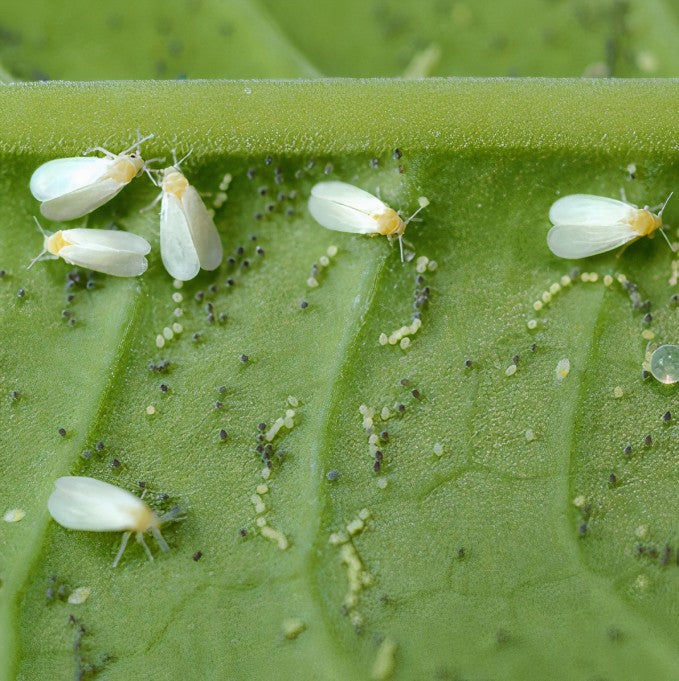
"Verticillium lecanii: The Green Guardian"
Introduction
In the hidden world beneath leaves and on insect bodies, a silent battle rages. In this fight for survival, a champion emerges – Verticillium lecanii, a naturally occurring entomopathogenic fungus.
Let's delve into the fascinating world of V. lecanii, exploring its uses and applications in the realm of sustainable pest control.
Verticillium lecanii
V. lecanii, previously known as Lecanicillium lecanii, is a filamentous fungus belonging to the Ascomycota phylum. It exists as microscopic spores that float in the air or adhere to surfaces.

A Natural Predator: How V. lecanii Fights Pests
V. lecanii acts as a biological control agent, targeting a wide range of soft-bodied insects, including:
Aphids
tiny, sap-sucking insects can devastate crops. V. lecanii spores land on aphids and germinate, sending fungal hyphae (thread-like structures) that penetrate the insect's body.
Mealybugs
These cottony white pests can damage plants by feeding on their sap. V. lecanii plays a similar role in controlling mealybug populations.
Whiteflies
These sap-sucking insects can transmit diseases to plants. V. lecanii spores can effectively target and control whitefly populations.

Scales
These armored insects feed on plant sap and can weaken or kill plants. V. lecanii can infect scales through cracks in their armor, leading to their death.
The Power of Spores: How V. lecanii is Used
Wettable Powders
These powders are mixed with water and sprayed onto plants. The spores adhere to the leaves and insects, waiting for contact.
Emulsifiable Concentrates
These liquid formulations are diluted with water and sprayed. They provide good coverage on plant surfaces
Bio-insecticidal Sprays
Ready-to-use sprays containing V. lecanii spores are convenient for small-scale applications.
Advantages of Using V. lecanii
Safe for Humans and the Environment
Unlike chemical pesticides, V. lecanii poses minimal risk to humans, beneficial insects, and wildlife.
Target-Specific
V. lecanii primarily targets soft-bodied insects, minimizing harm to other organisms in the ecosystem.
Long-Lasting Effect
Spores can remain viable for extended periods on plant surfaces, providing ongoing protection.
Organic Compatibility
V. lecanii is an organic pest control option, making it suitable for organic farming practices
Applications of V. lecanii
Agriculture
It protects a wide range of crops, including fruits, vegetables, and ornamentals, from insect pests.
Horticulture
V. lecanii safeguards greenhouses and nurseries from pest infestations
Urban Landscaping
It helps control pests in parks, gardens, and other urban green spaces.
Limitations of V. lecanii
Environmental Dependence
Factors like temperature, humidity, and UV light can affect the effectiveness of V. lecanii spores.
Slow Action
V. lecanii takes time to infect and kill insects. It may not be suitable for situations requiring immediate pest control.
Limited Availability
V. lecanii may not be readily available in all regions.
The Future of V. lecanii
Research is ongoing to improve the efficacy and application methods of V. lecanii.
With further advancements, this natural warrior can play an even more significant role in sustainable pest management, paving the way for a greener future for agriculture.
Conclusion
Incorporating Verticillium lecanii into your agricultural practices not only offers an effective solution against pests but also promotes environmental sustainability. This natural biocontrol agent harnesses the power of nature to protect your crops, reducing the need for chemical pesticides and fostering a healthier ecosystem. By choosing Verticillium lecanii, you’re not just defending your plants; you're contributing to a greener, more sustainable future.
At Khethari Agri Tech Private Limited, we are committed to providing innovative and eco-friendly solutions for modern agriculture. Embrace the benefits of Verticillium lecanii and join us in the journey towards a more sustainable and prosperous agricultural landscape.
